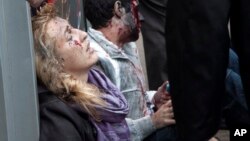ເຈົ້າໜ້າທີ່ສືບລັບ ໃນ Kyrgyzstan ກ່າວວ່າ ຜູ້ທີ່ສົງໄສໃນວາງລະເບີດທີ່ຮ້າຍແຮງ
ໃສ່ລົດໄຟໃຕ້ດິນ ໃນວັນຈັນວານນີ້ ທີ່ Russia ນັ້ນ ແມ່ນຊາວ Russia ທີ່ເກີດໃນ Kyrgyzstan.
ໂຄສົກຂອງ ໜ່ວຍສືບລັບ Kyrgyzstan ທີ່ເອີ້ນຫຍ້ໍວ່າ GKNB ລະບຸຕົວຜູ້ຕ້ອງສົງໄສ
ວ່າ ແມ່ນທ້າວ Akbarzhon Jalilov ຜູ້ຊຶ່ງເກີດຢູ່ທີ່ນັ້ນ ໃນປີ 1995. ອົງການຂ່າວ
Interfax ຂອງ Russia ໄດ້ລາຍງານກ່ອນໜ້ານີ້ວ່າ ເຈົ້າໜ້າທີ່ Russia ໄດ້ລະບຸຕົວ
ຜູ້ວາງລະເບີດແມ່ນ ຊາຍໜຸ່ມໄວ 23 ປີ ຈາກເອເຊຍກາງ.
ທ່ານ Veronika Skvortsova ລັດຖະມົນຕີສາທາລະນະສຸກຂອງ Russia ໄດ້ເພີີ່ມ
ຈຳນວນຂອງຜູ້ທີ່ເສຍຊີວິດ ຈາກ 11 ຄົນ ຂຶ້ນເປັນ 14 ຄົນ ໃນເຫດລະເບີດທີ່ນະຄອນ
St. Petersburg ໃນວັນອັງຄານມື້ນີ້ໃນກອງປະຊຸມຖະແຫຼງຂ່າວ. ມີເກືອບວ່າ 50 ຄົນ
ໄດ້ຮັບບາດເຈັບໃນເຫດລະເບີດທີ່ຮ້າຍແຮງຄັ້ງນີ້ ເພາະມັນສາມາດເຈາະທະລຸປະຕູ
ເຫຼັກທີ່ແໜ້ນໜາຂອງລົດໄຟໃຕ້ດິນ. ຍັງບໍ່ທັນມີຜູ້ໃດອອກມາອ້າງເອົາຄວາມຮັບຜິດ
ຊອບເທື່ອ ໃນຂະນະນີ້.
Danial Schearf ນັກຂ່າວ VOA ໄດ້ລາຍງານຜ່ານທາງ Twitter ວ່າ ບັນດາເຈົ້າໜ້າທີ່
ໄດ້ປິດສະຖານີລົດໄຟໃຕ້ດິນ ສະຖານີນຶ່ງ ທີ່ພົວພັນກັບເຫດລະເລີດໃນວັນຈັນວານນີ້
ຫຼັງຈາກ ທີ່ໄດ້ຮັບຂ່າວທາງໂທລະສັບທີ່ບໍ່ລະບຸຊື່ ກ່ຽວກັບເຫດລະເບີດທີ່ວ່ານີ້ ພ້ອມທັງ
ການນຳພາບຕ່າງໆຂອງພວກເຈົ້າໜ້າທີ່ສຸກເສີນ ສະຖານີລົດໄຟໃຕ້ດິນທີ່ຈະຕຸລັດ
Sennaya ໃນນະຄອນ St. Petersburg.
ລາຍການໂທລະພາບ Russia REN-TV ໄດ້ສະແດງໃຫ້ເຫັນເຖິງສົບຂອງຜູ້ເສຍຊີວິດ
ແລະພວກທີ່ບາດເຈັບ ນອນຢູ່ເທິງທາງຍ່າງໃນ ສະຖານນີລົດໄຟໃຕ້ດິນ ໃນຂະນະທີ່
ພວກເດີນທາງພາກັນຢ້ານກົວ ແຕກຕື່ນໜີກັນຢ່າງສົນລະວົນ ຊຶ່ງຜູ້ຄົນສ່ວນໃຫຍ່
ແມ່ນພາກັນປິດໜ້າຂອງພວກເຂົາເຈົ້າໄວ້ ຈາກຄວັນໜາ ທີ່ເກີດຈາກເຫດລະເບີດນັ້ນ.
ຕຳຫຼວດ ໄດ້ປົດຄະນວນລະເບີດອີກລູກ ທີ່ຫ້າງໄວ້ໃນຕູ້ເກັບອຸບປະກອນດັບໄຟ ທີ່ສະຖາ
ນີລົດໄຟໃຕ້ດິນ ແຫ່ງທີສອງ ໃນນະຄອນ St. Petersburg. ສະຖານີລົດໄຟໃຕ້ດິນ
ທົ່ວທັງເມືອງໄດ້ຖືກປິດລົງໃນວັນຈັນວານນີ້. Moscow ໄດ້ເອົາບາດກ້າວທີ່ເອີ້ນວ່າ
“ມາດຕະການເພີ່ມຕື່ມ” ຕໍ່ສະຖານີລົດໄຟໃຕ້ດິນ.
ເຈົ້າໜ້າທີ່ນະຄອນ St. Petersburg ໄດ້ປະກາດໄວ້ອາໄລ ຕໍ່ພວກທີ່ເຄາະຮ້າຍນີ້ເປັນ
ເວລາ 3 ວັນ. ທ່ານ Vladimir Putin ປະທານາທິບໍດີ Russia ບັງເອີນທີ່ທ່ານຢູ່ໃນບ້ານ
ເກີດຂອງທ່ານ ໃນນະຄອນ St. Petersburg ໃນວັນຈັນວານນີ້ ເພື່ອພົບປະກັບທ່ານ Alexander Lukashenko ປະທານາທິບໍດີ Belarus. ທ່ານ Putin ໄດ້ນຳເອົາພວງ
ມາລາໄປວາງໄວ້ ໃນສະຖານີລົດໄຟໃຕ້ດິນ ບ່ອນທີ່ໄດ້ມີຈຳນວນດອກໄມ້ແລະທູບທຽນ
ເພີ່ມຂຶ້ນເລື້ອຍໆ.
ປະທານາທິບໍດີສະຫະລັດ ທ່ານ Donald Trump ເອີ້ນເຫດລະເບີດນີ້ວ່າ “ເປັນເຫດ
ການທີ່ຊົ່ວຮ້າຍແທ້ໆ” ໃນຂະນະທີ່ ທ່ານ Antonio Guterres ໂຄສົກຂອງເລຂາທິ
ການໃຫຍ່ ຂອງອົງການສະຫະປະຊາຊາດ ໄດ້ກ່າວວ່າ “ພວກທີ່ວາງລະເບີດຄັ້ງນີ້
ຈະຕ້ອງຖືກນຳໂຕມາລົງໂທດ.”
Intelligence authorities in Kyrgyzstan say the suspect in Monday's deadly subway bombing in Russia is a Kyrgyz-born Russian citizen.
A spokesman for Kyrgyzstan's security service, the GKNB, identified the suspected as Akbarzhon Jalilov, who was born there in 1995. Russia's Interfax news agency earlier reported Russian authorities had identified the alleged bomber as a 23-year-old man from Central Asia.
Russian health minister Veronika Skvortsova raised the death toll from the blast in St. Petersburg from 11 to 14 Tuesday during a press briefing. Nearly 50 people were injured in the explosion, which was so powerful it blew a hole through the thick metal doors of a subway car. No one has claimed responsibility for the attack.
VOA correspondent Daniel Schearf is reporting on Twitter (https://twitter.com/DanielSSchearf/status/849180488598253568) that authorities have shut down one of the stations involved in Monday's incident after receiving an anonymous phone call about a bomb, along with retweets photos of emergency personnel at the Sennaya Square Metro station in St. Petersburg.
Russia's REN-TV showed dead and wounded lying on a station platform, as horrified passengers rushed by, many of them covering their faces to avoid the thick smoke.
Police defused another bomb hidden inside a fire extinguisher at a second St. Petersburg station. The city's entire subway was shut down for much of Monday. Moscow took what it called "additional security measures" on its metro.
Officials in St. Petersburg have declared three days of mourning. Russian President Vladimir Putin happened to be in his hometown of St. Petersburg Monday for a meeting with Belarusian President Alexander Lukashenko. Putin brought flowers to the subway station, where a memorial of flowers and candles grows.
U.S. President Donald Trump calls the blast an "absolutely terrible thing," while a spokesman for U.N. Secretary-General Antonio Guterres said "those responsible for this appalling act must be held accountable."
A terrorist attack would be quite serious, says the director general of the Russian International Affairs Council, Andrei Kortunov. "Because we have not experienced anything like that for a long period of time in Russia. And, definitely we are back to where we were some 10 or 12 years ago when these explosions unfortunately took place on a more or less regular basis," he said.
The last subway attack was in Moscow in 2010 when female suicide bombers connected to an Islamist insurgency in Chechnya were blamed for killing at least 33 people. Earlier bombings on the Moscow metro in 2004, also linked to Chechen terrorists, killed nearly 50 people.
"Obviously the North Caucasus is still a mess and there is always the sort of risk of terrorist attacks emanating from there," says the Institute of International Relations in Prague's Mark Galeotti, speaking via Skype. "But certainly the Federal Security Services' own assessments are, what they are particularly concerned about, is exactly some kind of connection with fighters, Russian fighters, who have joined Islamic State. What happens when they return? So, it could be that."
It would be the first time in recent memory that such an attack happened in Russia's second largest city.
"Somehow, Saint Petersburg was lucky to avoid such things," says Kortunov. "Of course, terrorists usually target the capital because it might give them high exposure. So, it sets a precedent."
"This could be the start of a trend or it could be a one-off," says Galeotti, who was speaking via Skype. "I think the key thing is, given that we will now probably see quite a stepping up of security in the short-term, if there are still more attacks, then I think this does spell exactly what the security services have been worried about, which is actually a resurgence of terrorism. If it's just a one-off attack though, probably things will quite quickly get back to normal."
Unlike previous incidents of suspected terrorism, Russian state media were quick to report details of the blast in Saint Petersburg.
"They learned a lesson, which is precisely by not covering stories all they end up doing is actually as it were, handing the narrative to rumor, gossip and Twitter," says Galeotti. "By actually reporting quickly and reporting fairly and honestly, actually what they do is they slightly tamp down potential panic and they sort of make sure that people are not automatically assuming that they're not being told most of the story."
The blast came as President Vladimir Putin, who is from Saint Petersburg, was visiting the city and meting with Belarus President Alexander Lukashenko.
"Definitely it could be connected because his presence there got a lot of media coverage," says Kortunov. "And, I think that though terrorists cannot target the president directly but, it is clearly a message for the president of the Russian Federation if it indeed was a terrorist attack."
Putin and Lukashenko expressed condolences to the relatives of the victims.
"Certainly, all causes are being considered, both common crime and manifestations of terrorism," Putin said as the two men met. "The investigation will soon provide all answers to what has happened."







